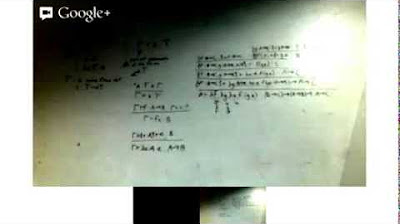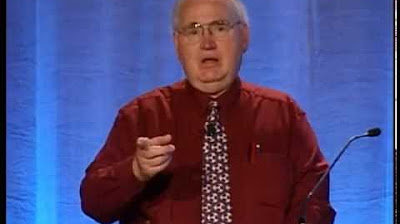Martin Hyland: "Algebra & Diagrams in the Lambda Calculus"
TLDRThis script delves into the intricate world of lambda calculus and algebraic theories, exploring their connection and representation in category theory. It discusses the concept of lambda theories as semi-closed algebraic theories and their retracts, illustrating how they naturally fit into the framework of category theory. The speaker presents the fundamental theorem of lambda calculus, highlighting the isomorphism between lambda theories and lambda algebras, and touches upon the implications for semantic models and dependent type theory, offering a deep yet accessible discourse on abstract computational structures.
Takeaways
- 🎂 The speaker expresses gratitude for being invited to a birthday event and acknowledges the challenge of promoting the value of abstract thought in a skeptical environment.
- 🤝 The speaker thanks the audience for introducing them to someone who helped them, presumably in their work or studies, which has been beneficial to them.
- 📚 The discussion delves into algebraic theories, explaining how they are defined categorically and are more than just abstract algebra concepts taught in math courses.
- 🔍 The concept of 'T-algebras' is introduced, illustrating how they are structures that embody the action of terms within algebraic theories, with a focus on their intuitive understanding from a concrete algebraic perspective.
- 📉 The speaker mentions the existence of a category of appreciates, or modules, which is less traditional and relates to the operational aspect of algebraic theories on both sides of an equation.
- 🧠 The importance of understanding the algebraic theory of extensions for any algebra is highlighted, suggesting a formal construction using code products.
- 📈 The speaker introduces the idea of 'Lambda theory' as a semi-closed algebraic theory, which is intricately related to the Lambda calculus, and explains its retract properties.
- 🔑 The Lambda calculus is characterized by its operation of taking a term and applying it to a new free variable, and how this operation is fundamental to the understanding of Lambda theory.
- 🔄 The speaker discusses the relationship between Lambda theories and Lambda algebras, emphasizing the isomorphism between them and how they can be translated into each other.
- 📝 The 'fundamental theorem of the Lambda calculus' is presented, which ties back to the traditional understanding of Lambda calculus and asserts the equivalence of the sophisticated theory picture with the traditional one.
- 🤔 The speaker ponders the role of semantic models in the context of Lambda calculus, suggesting that while they are complex, they can be understood through the lens of Lambda theories.
Q & A
What is the main theme of the speaker's discussion?
-The main theme of the speaker's discussion revolves around abstract thought, algebraic theories, and the connection between lambda calculus and categorical models, particularly focusing on the relationship between lambda theories and lambda algebras.
What does the speaker appreciate about the audience's efforts?
-The speaker appreciates the audience's efforts in convincing someone skeptical about the value of abstract thought and its applications.
What is an 'algebraic theory' as mentioned in the script?
-An 'algebraic theory' is a sophisticated concept that includes the operations and properties associated with algebraic structures such as rings, groups, etc., and is defined within a categorical framework.
What is the significance of the term 'lambda theory' in the context of the script?
-In the script, 'lambda theory' refers to a specific kind of algebraic theory that is semi-closed and has a retract of natural numbers, which is deeply connected to the lambda calculus.
What is the connection between lambda calculus and the concept of 'retracts'?
-The connection between lambda calculus and 'retracts' is that the transition from one lambda theory to another (e.g., from lambda n to lambda n+1) can be seen as an operation of applying a lambda term to a new free variable, which is a key concept in the lambda calculus.
What is the significance of the 'Scott Taylor theorem' mentioned in the script?
-The 'Scott Taylor theorem' seems to be a concept that the speaker is introducing, which likely relates to the categorical models and their interaction with lambda theories, although the exact details are not provided in the transcript.
What is the role of 'pre-sheaves' in the context of the script?
-In the script, 'pre-sheaves' are used in the context of categories to represent the generic object that has its function space, which is crucial for understanding the representation of lambda theories.
What is the fundamental theorem of the lambda calculus as discussed in the script?
-The fundamental theorem of the lambda calculus, as discussed, is the equivalence between lambda theories and lambda algebras, which provides a foundational understanding of the lambda calculus and its applications.
How does the speaker view the role of diagrams in explaining complex concepts?
-The speaker admits to not being very good with diagrams and ended up drawing fewer than expected, suggesting that while diagrams can be helpful, they may not always be the primary tool for explaining complex concepts like lambda theories.
What is the speaker's perspective on the importance of abstract thought in culture?
-The speaker believes that abstract thought is valuable and appreciates the efforts to convince skeptics of its worth, suggesting that it plays a crucial role in understanding and advancing complex ideas.
What is the relationship between lambda calculus and algebraic structures as per the script?
-The script suggests that lambda calculus can be interpreted within the context of algebraic structures, specifically through the lens of lambda theories and their connection to algebraic theories, showing a deep interrelation between the two.
Outlines
🎉 Introduction to Abstract Algebraic Theories
The speaker begins by expressing gratitude for being invited to a birthday event and acknowledges the challenge of promoting the value of abstract thought. They introduce the concept of algebraic theories, explaining them as a sophisticated explanation of what a universal algebraist would call an abstract claim. The speaker mentions the connection between algebraic theories and categories, particularly focusing on the algebraic theory of endomorphisms for any object in a category with products. They also discuss the existence of categories of T-algebras and the concept of T-algebras, which are structures that satisfy certain properties of terms in algebraic theories.
🧠 Lambda Theory and Its Relation to Lambda Calculus
The speaker delves into the concept of lambda theory, defining it as a semi-closed algebraic theory where each stage is a retract of the previous one in a composition-preserving manner. They relate this to lambda calculus, explaining that the transition from one stage to the next in lambda theory corresponds to the operation of applying a term to a new free variable. The speaker emphasizes that lambda calculus cannot be performed in the traditional algebraic sense without considering the structure of lambda theory, and they discuss the significance of the retracts in preserving substitution, a fundamental aspect of lambda calculus.
🔍 Exploring Lambda Theory in the Context of Retracts
The speaker discusses the automatic emergence of lambda theory in categories with products when considering retracts. They explain that having a retract view in such a category leads to an automatic map and a representation of theory. The speaker also introduces the Scott-Taylor theorem, which relates the category of pre-sheaves to the category of retracts, and how this interaction is fundamental to the understanding of lambda calculus in categories of retracts. The emphasis is on the minimal amount of calculus needed to confirm the theory, highlighting the importance of understanding the structure rather than extensive calculations.
🔄 Transition from Lambda Theories to Lambda Algebras
The speaker outlines the process of transitioning from lambda theories to lambda algebras, starting with the initial lambda theory and moving towards the construction of lambda algebras. They discuss the challenges of moving in the reverse direction, from lambda algebras to lambda theories, and the subtleties involved in this process. The speaker also introduces the concept of endomorphism theory derived from lambda algebras and how it relates to lambda theories, emphasizing the importance of understanding the functoriality of this process.
📚 Fundamental Theorem of Lambda Calculus
The speaker presents the fundamental theorem of lambda calculus, which establishes the equivalence between lambda theories and lambda algebras. They explain that this theorem is crucial because it lays the groundwork for understanding the relationship between the sophisticated theory of lambda calculus and the more traditional, algebraic structure of lambda algebras. The speaker also touches on the idea that every lambda theory is isomorphic to a lambda algebra, highlighting the importance of this theorem in recognizing the underlying algebraic structure in lambda calculus.
🤔 Reflections on Lambda Calculus and Semantic Models
In the final paragraph, the speaker reflects on the implications of the lambda calculus discussion for semantic models, such as game models, and the challenges of understanding the structure of lambda abstraction in these models. They discuss the limitations of knowing only the application of a term and the importance of understanding the underlying structure. The speaker also hints at the complexity of dependent type theory in the context of lambda calculus and the subtleties of extending the theory beyond the initial beta fragment.
Mindmap
Keywords
💡Abstract Thought
💡Algebraic Theory
💡Lambda Calculus
💡Category Theory
💡Endomorphisms
💡T Algebras
💡Retracts
💡Semantics
💡Pre-Sheaves
💡Scott's Theorem
💡Lambda Theory
Highlights
Introduction of the concept of algebraic theories in a categorical definition and their relation to universal algebra.
Discussion on the algebraic theory of endomorphisms for any object in a category with products.
Explanation of the category of T-algebras and their significance in algebraic theories.
Insight into the algebraic theory of extensions and its formal construction using code products.
Introduction of the category of appreciates of a monad as a less traditional aspect of algebraic theory.
Clarification on the terminology and distinction between modules and appreciates in the context of algebraic theory.
The concept of lambda theory as a semi-closed algebraic theory and its connection to lambda calculus.
Elucidation on the retracts in lambda theory and their natural and respecting composition way.
The representation of lambda theory in the category of pre-sheaves and its implications.
Introduction of the Scott-Taylor theorem and its significance in the context of lambda theory.
Discussion on the initial lambda theory and its equivalence to the classical lambda calculus notion of lambda algebra.
Exploration of the process of moving from lambda theories to lambda algebras and vice versa.
The importance of the monad in lambda calculus and its role in the construction of lambda theories.
The fundamental theorem of lambda calculus tying the sophisticated theory picture with the traditional picture.
Reflection on the practical applications and semantic constructions in lambda calculus models.
Discussion on the role of eta rules in lambda calculus and their impact on the theory.
Final thoughts on the fundamental theorem as the basis for understanding the lambda calculus.
Transcripts
5.0 / 5 (0 votes)
Thanks for rating:





